In This Episode << SLIDE LEFT TO SEE ADDITIONAL SEGMENTS
Seminaries and Sex
BOB ABERNETHY, anchor: Now a special report on teaching about sex and gender issues in theological seminaries—or really not teaching about them: sexual problems in marriage; gay, lesbian and transgender questions; kids having sex at ever younger ages. Some religious leaders are concerned that many seminarians are not being taught what they need to know to become good counselors to their future parishioners. Judy Valente reports.
Professor LAUREL SCHNEIDER (Chicago Theological Seminary, teaching class): Sex and sexuality is of course a very significant part of our experience. And I put the question up here, “Is sex divine?”
JUDY VALENTE: Professor Laurel Schneider of Chicago Theological Seminary teaches an evening course in systematic theology. Most of the time, it’s hardly sexy stuff. But this evening the topic is sex. This seminary is one of the few where human sexuality, in all its facets, is openly discussed.
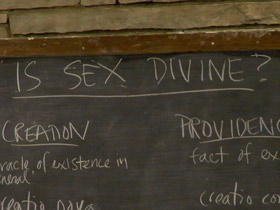 UNIDENTIFIED TRANGENDERED STUDENT: My oldest son right now won’t even talk to me, won’t have anything to do with me. His comment to me was, “God created you as a man and God does not make mistakes.”
UNIDENTIFIED TRANGENDERED STUDENT: My oldest son right now won’t even talk to me, won’t have anything to do with me. His comment to me was, “God created you as a man and God does not make mistakes.”
UNIDENTIED FEMALE STUDENT: The male who has become a female, that part of you inside that wants — that feels female — that wants to be female, that’s still a part of you. That’s still — God made that too.
VALENTE: Sexual mores have been changing. But how well are seminaries preparing future pastors and rabbis to address these changes? The Religious Institute on Sexual Morality is a nonprofit group that helps promote sexual health in faith communities. The Institute recently studied 36 seminaries across denominational lines. The study found an “overwhelming need” to better educate and prepare future religious leaders in the area of human sexuality.
Dr. KATE OTT (Associate Director, Religious Institute on Sexual Morality, Justice and Healing): We see these issues every day and the harm that can be done around sexuality issues — either a kid who’s questioning their orientation, a couple whose marriage is failing. I think when those folks are coming to us in faith communities for real information and for real help, we need to make sure we have the training to be able to address that.
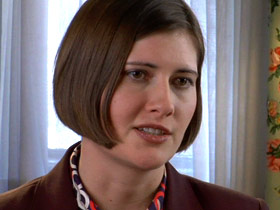 VALENTE: Many pastors say issues such as teen sexual activity and marital infidelity are among the most common topics about which congregation members seek guidance. Yet few seminaries offer courses in sexuality, and fewer still require these courses.
VALENTE: Many pastors say issues such as teen sexual activity and marital infidelity are among the most common topics about which congregation members seek guidance. Yet few seminaries offer courses in sexuality, and fewer still require these courses.
Dr. ALICE HUNT (President, Chicago Theological Seminary): It’s a challenge. It’s controversial. It makes people feel uncomfortable. It makes people feel insecure. So it’s just taking time for schools to come on board with addressing these issues.
Dr. OTT: When seminaries don’t offer the courses, they’re still talking about the issue. They’re just talking about it from silence and from a negative perspective, and seminary students understand that. They hear both messages loud and clear, and we would just prefer that they get a positive, open message rather than a silenced or dismissive message.
VALENTE: Some clergy have criticized the Religious Institute’s report saying seminaries can’t teach everything, that students aren’t there primarily to obtain “how to” skills, but to study biblical texts, to reflect and pray. Dr. Hunt says it’s a legitimate point.
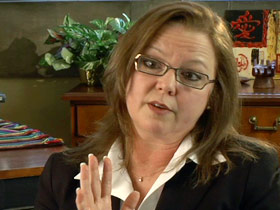 Dr. HUNT: You have to, then, change your whole curriculum. If you want to incorporate issues of human sexuality and race and gender, you have to examine everything you’re teaching in your educational context, and that’s a lot of hard work.
Dr. HUNT: You have to, then, change your whole curriculum. If you want to incorporate issues of human sexuality and race and gender, you have to examine everything you’re teaching in your educational context, and that’s a lot of hard work.
VALENTE: As a result, graduating seminarians are often expected to “learn on the job.” Reverend Lillian Daniel is the senior pastor of First Congregational United Church of Christ in Glen Ellyn, Illinois. She recalls one of the few classes at her divinity school where sex was discussed.
Reverend LILLIAN DANIEL (Senior Pastor, First Congregational United Church of Christ, Glen Ellyn, IL): The teacher goes “Never, ever, ever — with anyone in your congregation.” We all thought, “Did we miss the verb? What is it? Go skiing? Go dancing?” I mean, he couldn’t even bring himself to say the word, and that was the extent of the conversation.
VALENTE: And the word would have been?
Rev. DANIEL: Don’t sleep with.
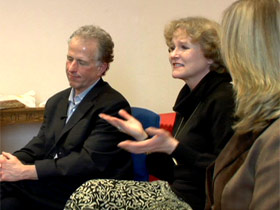 VALENTE: Daniel says seminaries often discuss gender rights, sexual harassment, and how pastors should maintain proper boundaries with their congregation members. But, she says, they rarely train students to deal with the complex, intimate questions congregation members are likely to bring to them.
VALENTE: Daniel says seminaries often discuss gender rights, sexual harassment, and how pastors should maintain proper boundaries with their congregation members. But, she says, they rarely train students to deal with the complex, intimate questions congregation members are likely to bring to them.
JENNY GRESKO (Therapist, Central DuPage Pastoral Counseling Center, speaking to group): “We don’t have as much sex as he wants and we have more sex than I want and we’ll never fix this.” That’s a very, very common issue between couples.
VALENTE: As part of a Sunday afternoon series on sexuality, Daniel’s congregation has been examining a variety of issues connected with marriage.
JOE FORTUNATO (Congregant): Sexuality isn’t bad. It’s something that’s a good thing. It’s a gift from God, which is the cliché, but it is a gift from God, and to deal with it honestly and openly is very, very important, I think, to a lot of people here.
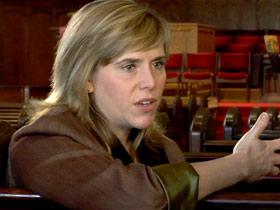 Rev. DANIEL: I’m all in favor referring people on to folks with more expertise if they’ve got sort of issues that are ongoing. But a lot of times people come in to see a pastor because they want to tell something one time. Or they just want a reality check. Or they just want some kind of comfort or someone to listen to them. Sometimes it’s almost in the area of a confession. So in those cases, we may be their only stop.
Rev. DANIEL: I’m all in favor referring people on to folks with more expertise if they’ve got sort of issues that are ongoing. But a lot of times people come in to see a pastor because they want to tell something one time. Or they just want a reality check. Or they just want some kind of comfort or someone to listen to them. Sometimes it’s almost in the area of a confession. So in those cases, we may be their only stop.
VALENTE: Chicago Theological, a United Church of Christ seminary, received a high rating in the Religious Institute study. But even this school doesn’t require students to study human sexuality. It does, however, offer several sexuality courses. Alice Hunt says the seminary wants its graduates to be able to minister to the “whole person.”
Dr. HUNT: Understanding what your tradition says about human sexuality, being sexually healthy yourself, understanding what religious texts say, being aware of counseling issues, knowing how human development happens with sexuality, being aware of societal constraints and the fear that people face for not being able to fully express who they are — all of those are crucial in becoming a mature minister.
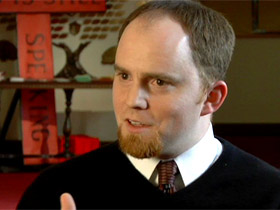 Rev. DANIEL: The problem is it really falls upon the pastor to seek out that knowledge, and if you were somebody who wanted to shut yourself away from this, you really could, and your church could become a place where none of this is able to be talked about.
Rev. DANIEL: The problem is it really falls upon the pastor to seek out that knowledge, and if you were somebody who wanted to shut yourself away from this, you really could, and your church could become a place where none of this is able to be talked about.
VALENTE: But there does seem to be a shift in generational attitudes. Today’s young seminarians, who grew up in a more sexually liberal culture, seem eager to address these matters openly.
MARK WINTERS (Student, Chicago Theological Seminary): I think that, generally speaking, younger folks tend to see, for instance, homosexuality as basically a non-issue, whereas older folks come from a different time and a different place where you weren’t as open about sex and sexuality, and I think I would include heterosexuality in that as well as homosexuality, as you alluded to in the question, in terms of cohabitation for heterosexual couples. I think, generally speaking, we are in a more nonjudgmental time, and I consider that a very good thing.
VALENTE: Many pastors would disagree. Nonetheless, questions of gay marriage and whether to ordain gay clergy have moved sexuality issues to the forefront in many churches. Alice Hunt says there is a far more fundamental reason for making sex a topic of discussion.
Dr. HUNT: I hope another imperative is the imperative of God’s love, a kind of radical inclusivity of everything that promotes human flourishing. I hope we’ll take it — a good look at what we need to do to get to the space where we can fully minister to our congregation.
Dr. OTT: Our sexuality is part of our spirituality. We’re embodied beings, and most of our faith traditions believe that God gave us the gift of sexuality, so it has deep theological meaning for us. So I don’t think we can say sexuality isn’t a religious issue. It deeply is a religious issue.
VALENTE: The Religious Institute recently received a grant to help seminaries introduce sexuality courses and provide continuing education classes for those already in ministry. One young seminarian described this as a “coming out time” for sexuality discussions in faith communities. “If sex is a common topic in the Bible,” he asked, “then why shouldn’t it be talked about in churches and seminaries?”
For Religion & Ethics NewsWeekly, I’m Judy Valente in Chicago.

